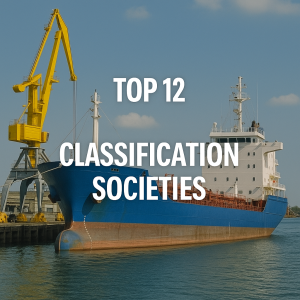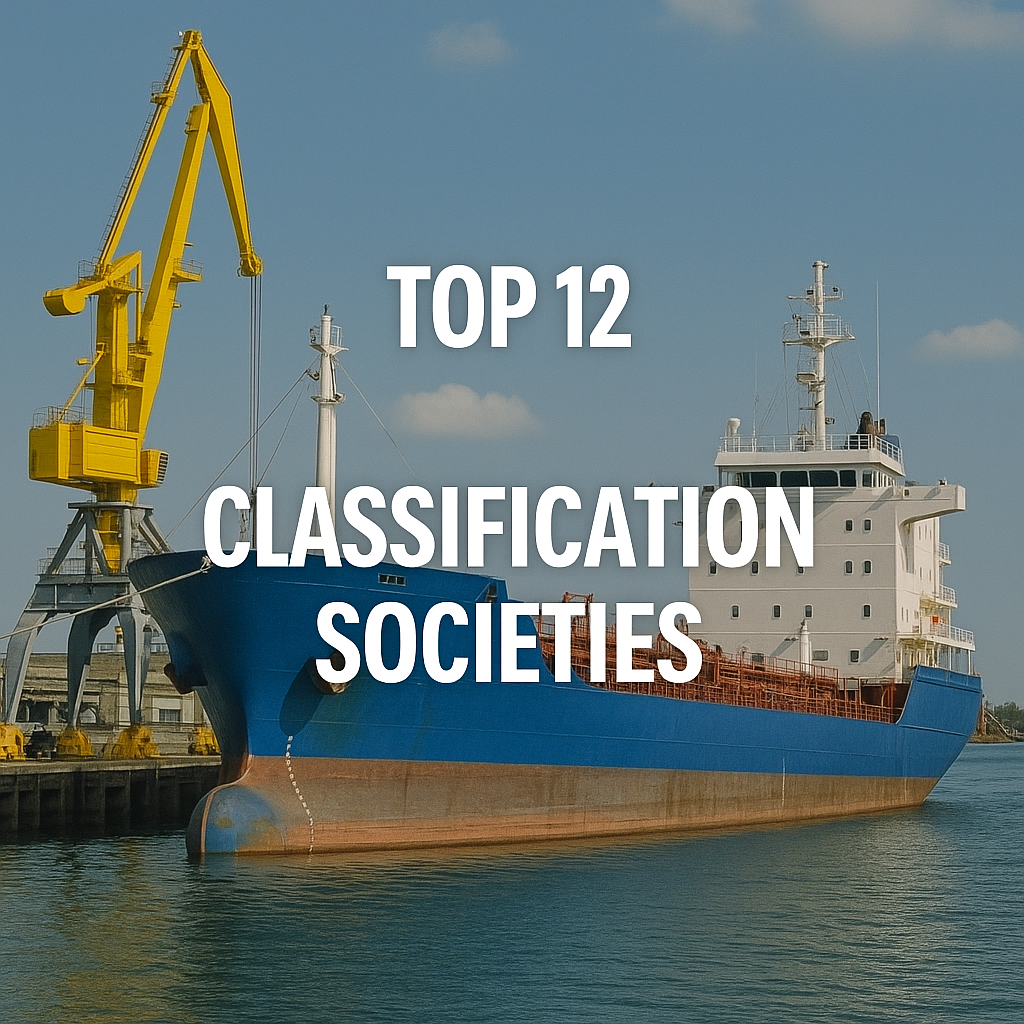Discover the top 12 classification societies guiding global maritime safety and compliance. Learn how they shape ship design, inspection, and regulation in this authoritative industry overview.
Why Classification Societies Matter in Modern Maritime Operations
Classification societies are essential pillars of the maritime world. These independent organizations set technical standards for the design, construction, and maintenance of ships and offshore structures. They ensure that vessels meet safety and environmental benchmarks, playing a critical role in global shipping.
Without classification societies, modern maritime trade would lack structure and uniformity. According to the International Association of Classification Societies (IACS), over 90% of the world’s cargo-carrying tonnage is covered by IACS members. These societies support shipowners, insurers, ports, and regulatory agencies by certifying seaworthiness and guiding compliance with SOLAS, MARPOL, and IMO regulations.

1. DNV (Norway)
- Full Name: DNV (formerly Det Norske Veritas)
- Founded: 1864
- Global Standing: Largest classification society by tonnage classed
- Specialties: Decarbonization, offshore wind, LNG vessel classification
- Digital Tools: Veracity platform, digital class services
Website: https://www.dnv.com
2. Lloyd’s Register (UK)
- Founded: 1760 (oldest classification society)
- Strengths: Naval architecture, autonomous shipping, cyber risk management
- Innovations: Digital twins, zero-carbon fuel evaluation frameworks
Website: https://www.lr.org
3. American Bureau of Shipping (ABS)
- Founded: 1862
- Headquarters: Houston, Texas, USA
- Highlights: LNG carriers, FPSOs, U.S. Navy contracts
- Sustainability Focus: ABS MyDigitalFleet™, greenhouse gas lifecycle analytics
Website: https://www.eagle.org
4. Bureau Veritas (France)
- Founded: 1828
- Expertise: Passenger vessels, decarbonization strategy consulting
- Services: Classification, statutory certification, marine renewables
Website: https://marine-offshore.bureauveritas.com
5. ClassNK (Japan)
- Full Name: Nippon Kaiji Kyokai
- Established: 1899
- Core Services: LNG vessels, container ships, cybersecurity compliance
- Digital Innovations: GHG Emissions management portal, e-Certification
Website: https://www.classnk.or.jp
6. RINA (Italy)
- Full Name: Registro Italiano Navale
- Focus Areas: Yachts, passenger ships, environmental certification
- Green Tech Leadership: Hybrid propulsion, energy efficiency programs
Website: https://www.rina.org
7. Korean Register (KR)
- Founded: 1960
- Fleet Focus: Bulk carriers, LNG, VLCCs
- Digital Services: Smart Fleet™, blockchain for ship registry
Website: https://www.krs.co.kr
8. China Classification Society (CCS)
- Established: 1956
- China’s National Class Society: State-backed, growing international influence
- Innovation: Smart ship platform, Polar Code certification for ice-class vessels
Website: http://www.ccs.org.cn
9. Indian Register of Shipping (IRS)
- Founded: 1975
- Key Areas: Defense vessels, inland waterway ships, dredgers
- Global Recognition: Full IACS member since 2010
- Technology: Green retrofit consulting, hull structure modeling
Website: https://www.irclass.org
10. Croatian Register of Shipping (CRS)
- Founded: 1949
- Strengths: Fishing vessels, smaller cargo ships, and regional ferries
- Sustainability: EEDI verification, ballast water system approvals
Website: https://www.crs.hr
11. Russian Maritime Register of Shipping (RS)
- Founded: 1913
- Focus: Arctic shipping, ice-class vessels, nuclear-powered ships
- Recent Context: Sanctions have limited global cooperation, but fleet classed remains significant
Website: https://www.rs-class.org
12. Vietnam Register (VR)
- Established: 1964
- Services: Shipbuilding inspections, domestic merchant vessel classification
- Emerging Role: ASEAN regional maritime oversight and growth in inland shipping
Website: https://vr.org.vn
Case Studies: Classification Societies in Action
DNV: Decarbonizing the Deep Sea
DNV launched the “Maritime Forecast to 2050” series, guiding industry decarbonization through scenario modeling. Its approval of ammonia-ready designs and carbon capture onboard systems shows its commitment to IMO 2050 goals.
ABS: U.S. Offshore and Defense Powerhouse
ABS has expanded its portfolio in the offshore energy sector—classing floating LNG units and offshore wind platforms. It also partners with the U.S. Navy for cybersecurity and vessel resilience.
ClassNK: Japan’s Digital Frontier
ClassNK is working closely with Mitsubishi and NYK on autonomous ship trials and AI-based condition monitoring systems. Their “Innovation Endorsement” program is fostering maritime startups.
FAQs
1. What is a classification society? A classification society is an independent organization that establishes and maintains technical standards for the design, construction, and operation of ships.
2. What is IACS? The International Association of Classification Societies (IACS) is an umbrella body comprising the world’s most influential classification societies. It harmonizes standards and promotes safety.
3. Are classification societies government bodies? No. They are independent, though they may be authorized to act on behalf of flag states for statutory inspections and certifications.
4. What is the difference between class rules and IMO regulations? Class rules are set by classification societies, while IMO regulations are international treaties enforced by flag states. Class rules often go beyond IMO minimums.
5. How do societies contribute to decarbonization? They assess new fuels (like ammonia and hydrogen), verify energy efficiency technologies, and support compliance with EEXI, CII, and EU ETS requirements.
6. Can ships operate without classification? While technically possible, most ports, insurers, and charterers require vessels to be classed, making it commercially unviable to operate outside classification.
7. Which is the best classification society? “Best” varies by need—DNV for digital and decarbonization, ABS for offshore, ClassNK for tech-forward innovations, and LR for cyber and autonomous vessels.
Conclusion
Classification societies form the backbone of maritime safety, compliance, and innovation. From enabling the world’s greenest ships to certifying Arctic vessels and regulating autonomous navigation, these 12 institutions guide the industry’s evolution.
For shipping companies, naval architects, regulators, and maritime students, understanding the roles and strengths of each classification society is vital for operational success, safety assurance, and future readiness.
Call to Action: Stay updated through IACS bulletins, society publications, and regulatory updates to understand how classification is shaping the future of shipping.
References
- IACS. (2024). Member Societies & Regulatory Roles. https://www.iacs.org.uk
- DNV. (2024). Maritime Forecast to 2050. https://www.dnv.com
- Lloyd’s Register. (2023). Cyber and Autonomous Ship Solutions. https://www.lr.org
- ABS. (2024). Offshore and Marine Class Services. https://www.eagle.org
- ClassNK. (2024). Digital Transformation Initiatives. https://www.classnk.or.jp
- Bureau Veritas. (2023). Environmental Classification. https://marine-offshore.bureauveritas.com
- RINA. (2024). Hybrid and Sustainable Ship Technologies. https://www.rina.org


I wanted to thank you for this great read!! I definitely
enjoyed every little bit of it. I have you saved as a favorite to check out new stuff you post…
Hello i am kavin, its my first occasion to commenting anyplace, when i read this piece of writing i thought i could also make comment due to this good piece of writing.